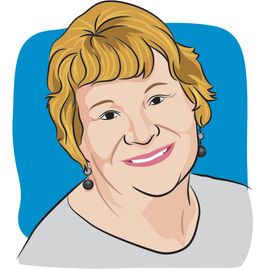- About Us
- Advertise / Support
- Editorial Board
- Contact Us
- CancerNetwork.com
- TargetedOnc.com
- OncLive.com
- OncNursingNews.com
- Terms & Conditions
- Privacy
- Do Not Sell My Information
- Washington My Health My Data
© 2025 MJH Life Sciences™ and CURE - Oncology & Cancer News for Patients & Caregivers. All rights reserved.
Cancer Remission Is Wonderful But Scary

Jane Biehl is a 12-year survivor of a very rare form of blood cancer, known as myelodysplastic syndrome (MDS). She has enjoyed several exciting careers including a librarian, counselor, teacher, and writer. She loves to write about surviving cancer, overcoming hearing loss and the wonderful benefits of having a hearing-ear service dog.
I’ve experienced mixed emotions during my periods of remission for my myelodysplastic syndrome.
In January 2022, I was told unless I had a bone marrow transplant (BMT), I had less than a year or two to live. In May of 2024, I am on a new treatment plan and feeling better than I did before being diagnosed with a myelodysplastic syndrome (MDS), an incurable cancer. Talk about whiplash!
Whether or not to have the BMT was a very difficult decision. But after a second opinion and being told the chances of it working were 30% and I would be down at least a year, I discussed other treatments with my doctors.
There was a brand-new treatment called Reblozyl (luspatercept) approved during COVID. The problem was no one honestly knew a lot about this drug. Reblozyl is called an erythroid maturation agent (EMA) and the purpose is to develop mature working red blood cells that cause anemia. I opted to have Reblozyl. I knew the drug and dosage were dependent on how my hemoglobin looked during my monthly blood draws.The protein in red blood cells is responsible for delivering oxygen to the cells. Simply put – if the amount of oxygen is lower and the body is not receiving enough of it, fatigue occurs. Other complications arise and many patients with MDS die from other causes such as pneumonia. By maturing the red blood cells, the body is functioning more normally. The drug targets the late stages of MDS.
I had no idea any of this would happen when I started this drug, but knew I needed to take the chance. To say that I am humbled, thrilled and feel like a new lease on life has been granted is true. After fighting MDS for 14 long years where other treatments took a huge chunk of my hearing away from me, caused me to lose most of my teeth, made me suffer crippling muscle pains and having chronic diarrhea 24/7, I am beyond grateful for this wonder drug.
Emotionally I do have a caveat. Why me? Interestingly I never asked myself this when I first was diagnosed with cancer because I have lost several close friends and family members die from this devastating disease. I do ask myself why I have survived when others have not. These include children, young parents, people in the prime of life and the elderly who we have loved and been taken away from us. I never dreamed I would live to age 73. I do feel guilty.
After so many ups and downs, I ask myself frequently when the ball will drop. I am a realist and know all this positive health could come to a screeching halt anytime. The drug could stop working, crazy side effects could occur and I would have to discontinue it, and I could still catch pneumonia or another fatal disease. The list goes on and on.
Yes – temporary remission is wonderful and what we all seek. I am finishing writing my book, seeing lots of friends, attending books club and writing meetings, and traveling again for the first time since COVID.
To deal with these guilty emotions I look at the bigger picture. Why after a tornado is one home spared and the next one a pile of rubble? Why in an accident is one person survive and another one killed? This is when I realized how infinitesimal we are in a vast universe. Life can be random and cruel, but it can be wonderful and exhilarating.
I try not to waste any of my time wondering “what if” and “why.” That means taking away precious physical and emotional time to enjoy and seize the day. Every one of us must learn this story, but cancer survivors face making decisions and realize more deeply how life is a gift. Enjoy the present because the past is over, the future uncertain, and today is here to cherish!
For more news on cancer updates, research and education, don’t forget to subscribe to CURE®’s newsletters here.
Related Content:



